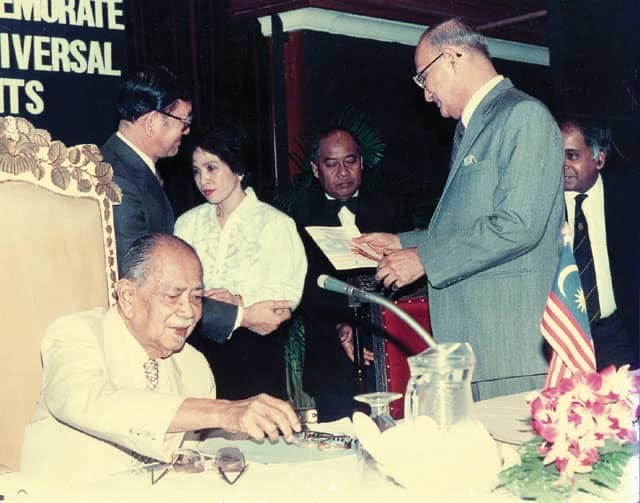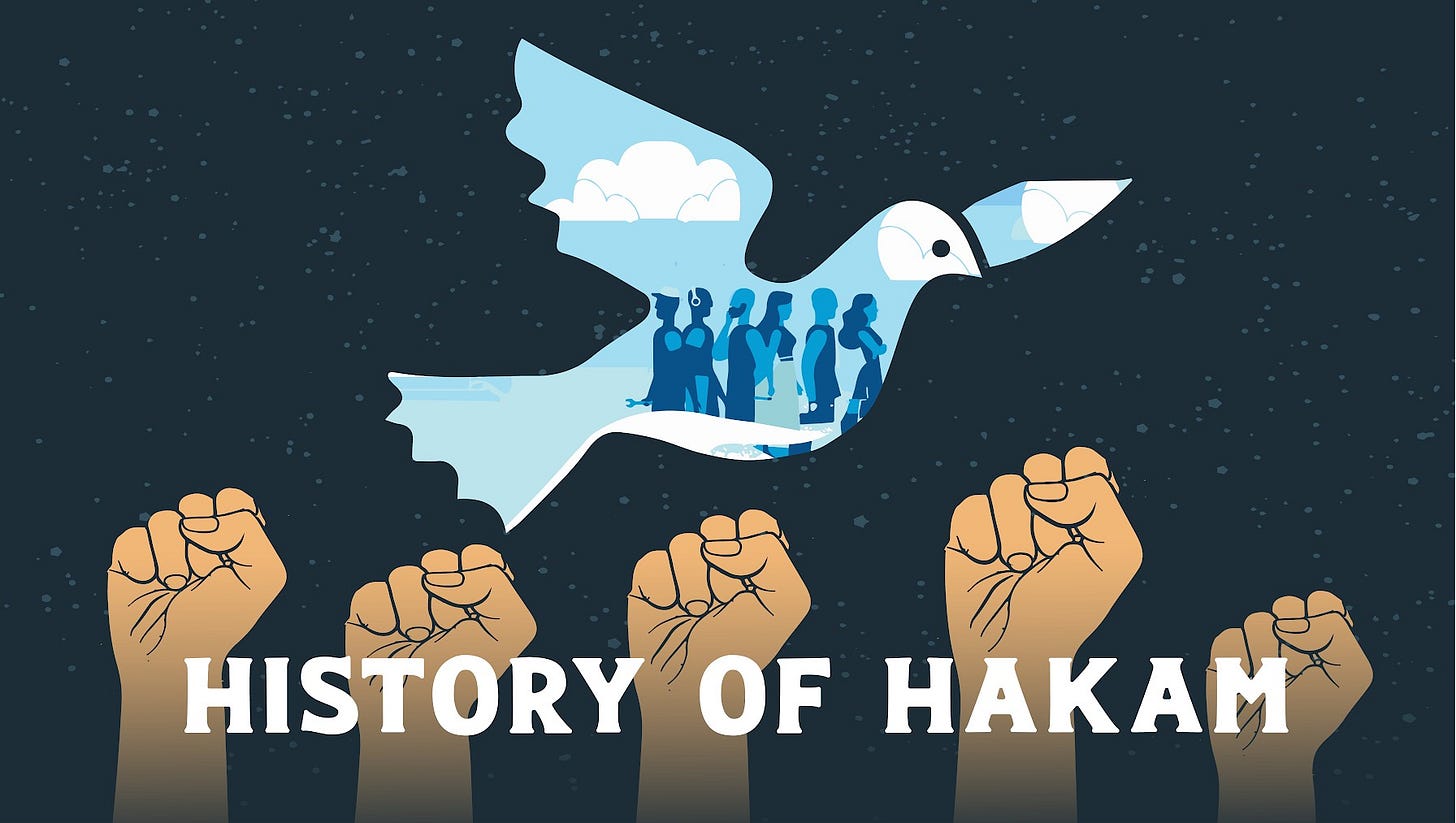The History of HAKAM
SUARA MANDIRI Issue #1
The Persatuan Kebangsaan Hak Asasi Manusia, or the National Human Rights Society, more commonly known as ‘HAKAM’ is a non-governmental organisation (NGO) that aims to promote, preserve and defend human rights in Malaysia. It champions the abolishment of laws that violate fundamental human rights, addresses complaints about human rights violations, and lobbies the government to ratify international and regional human rights instruments.
The events in the 1980s have led up to the founding of HAKAM. The decade was one that is rather turbulent politically and socially. Politically, the ruling government faced internal challenges to its leadership, resulting in UMNO splitting into two. Domestically, dissent amongst the civil society was rising to a fever pitch due to blatant government violations on the fundamental liberties of Malaysians. This led to the government’s retaliation via leading a series of crackdowns on civil society and opposition that included the infamous Operasi Lalang in 1987 and the 1988 Judicial Crisis.
During Ops Lalang in 1987, 106 persons, including NGO activists, opposition politicians, intellectuals, students, artists and scientists, among others, were detained without trial under the Internal Security Act (ISA). The Star and Sin Chew Jit Poh also had their licenses revoked in the aftermath of the operation.
Ops Lalang happened amidst the backdrop of a split within UMNO to two opposite factions and rising ethnic tensions between different ethnic groups in Malaysia; kickstarting the events that led to the 1988 Judicial crisis. It began with the UMNO party elections in 1987, in which Tun Mahathir Mohammad and Ghafar Baba (commonly known as ‘Team A’) narrowly defeated Tengku Razaleigh Hamzah and Datuk Musa Hitam (known as "Team B") by 43 votes. The legitimacy of the election was challenged on the grounds that at least 30 branches had sent delegates to the UMNO elections and that should have voided the results. The judge then declared that UMNO is ‘an unlawful society’, citing Article 41 of the Societies Act; whereby any society would automatically become ‘unlawful’ if any of its branches were not registered with the Registrar of Societies. Mahathir announced the registration of UMNO Baru, in which Team A members took up leadership positions.
Further, the Ministry of Education’s decision to appoint 100 senior assistants and principals to vernacular Chinese schools sparked outrage within the Chinese community in Malaysia. In response to this, politicians from MCA, DAP, GERAKAN, and major Chinese based parties joined the protests; Dong Jiao Zong (Chinese Education Movement) held a 2000-man strong gathering. There were also plans to boycott for three days in Chinese schools if the government did not settle the issue.
Although the boycott was eventually called off however, UMNO Youth led a mass rally while UMNO politicians condemned MCA leaders for colluding with Dong Jiao Zhong and DAP. Both sides called for MCA Deputy President and Labour Minister Lee Kim Sai, and UMNO Education Minister Anwar Ibrahim to resign. In the absence of Prime Minister Tun Mahathir, UMNO called for the holding of a rally to celebrate its 41st Anniversary, expecting a turnout of half a million members.
The proposed UMNO rally became one of the possible reasons for the government led crackdown. The White Paper explained that the racial tensions reached ‘dangerous proportions’, forcing the government to act ‘swiftly and firmly’. Many however, saw this as an excuse for Mahathir’s government to tighten its stronghold by restricting fundamental liberties.
Moreover, the 1988 Judicial Crisis resulted in the suspension and eventual removal of the Lord President of the Supreme Court, Tun Salleh Abas from his seat. The Lord President of the Supreme Court, Tun Salleh Abas, and two other judges ordered for two appeals to be heard on different occasions; one regarding the UMNO party elections in 1987 and the case of Minister of Home Affairs v Karpal Singh. With the assistance of three other senior judges, he wrote a letter to the Yang di-Pertuan Agong, requesting his royal highness to intervene and reduce the tension between the executive and judiciary. The letter expressed disappointment with accusations made against the judiciary by the Prime Minister.
Tun Salleh Abas was then called for a tribunal convened by Tun Mahathir on the grounds of misconduct. In response, he filed a suit in the High Court challenging the constitutionality of the tribunal. The five Supreme Court judges who granted Salleh an interlocutory order against the tribunal were also suspended, where eventually, two of the five were sacked in October that year. Salleh was officially deposed from his position of Lord President in August 1988. This crisis had effectively eroded the ability of the judicial system in promoting checks and balances; the implications of which are still widely felt today.
Against the backdrop of stark human rights violations, the first Prime Minister Tunku Abdul Rahman was compelled to spearhead the establishment of HAKAM. HAKAM was founded on the 40th Anniversary of the Universal Declaration of Human Rights on 10th December 1988. Human rights luminaries in Malaysia, together with Tunku Abdul Rahman, Tun Hussein Onn, Raja Aziz Addruse, Dr. Tan Chee Khoon, and Tan Sri Ahmad Nordin stood together in declaring the salient formation of HAKAM Malaysia.

The founding constitution is as follows:
“Whereas by Proclamation of Independence dated the 31st day of August 1957, this Nation was proclaimed a sovereign democratic and independent nation founded upon the principle of liberty and justice ever seeking the welfare and happiness of its people and the maintenance of a just peace among all nations.
Whereas this Nation upon becoming a member of the United Nations Organisation, subscribed to the principles embodies in the Universal Declaration of Human Rights.
Whereas there has been a constant erosion of these principles.
We hereby declare that there is a need to promote, preserve, and defend these principles and hereby propose there be established a national organisation for that purpose.”
-Declared in Kuala Lumpur, 10th of December 1988, on the occasion of the 40th Anniversary of the UDHR.
With the establishment of HAKAM, Tunku Abdul Rahman became the first pro-term chairman before being succeeded by Tun Hussein Onn. On 29th August 1989, Tun Hussein Onn proceeded to apply for HAKAM to be registered with the Registrar of Society. Unfortunately, both passed away in 1990 before they could see it in full fruition. HAKAM eventually received formal registration with the Malaysian Registrar of Societies under the Societies Act 1966 on 14 June 1991, where HAKAM became the very first human rights NGO in Malaysia to be registered under the Societies Act.
Aside from the former two Prime Ministers, HAKAM was led by a list of notable figures in the legal fraternity. The passing of this torch involved chairmen Tan Sri Ahmad Nordin, Raja Aziz Addruse, Ramdas Tikamdas, Cecil Rajendra, and Datuk Malik Imtiaz Sarwar. Presently, Dato’ Dr. Gurdial Singh Nijar leads HAKAM since 2018.
Over the past 32 years, HAKAM has been engaged in advocating for human rights. This includes pertinent initiatives such as publishing press statements, holding forums and engaging stakeholders to strengthen human rights in Malaysia. Notable efforts from the past includes demanding justice for the 1988 police shootings, contributing to SUHAKAM’s formation in 1999, calling for the abolishment of ISA, raising awareness on corruption in 1995 and promoting freedom of expression in arts in 2003.
As our first Prime Minister and HAKAM founding chairman, Tunku Abdul Rahman aptly puts
“we should set up societies throughout the country for the defence of fundamental principles of human rights. We should make ourselves heard more often and more effectively”
It is therefore imperative for all levels of society to continually engage and support HAKAM’s goals. With a myriad of repressive laws that still remain intact and unchallenged, the fight against oppression and infringement of fundamental rights is far from over.


